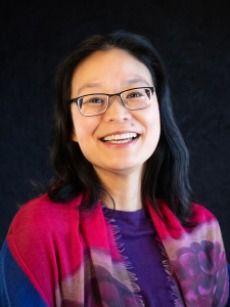Arum Park has been at the University of Arizona since 2015. She has published on Archaic and Classical Greek poetry, the ancient Greek Novel, and Augustan poetry, as well as on #metoo in ancient Greco-Roman literature, race and diversity in Classics, and Classical reception. Her research and teaching interests include gender, truth, intertextuality, and race and ethnicity. The daughter of Korean immigrants, she co-chaired the Asian and Asian American Classical Caucus from 2021-2025.
Publications
Books
Reciprocity, Truth, and Gender in Pindar and Aeschylus. University of Michigan Press (2023). Featured in Pasts Imperfect (6.8.23).
Resemblance and Reality in Greek Thought. Essays in Honor of Peter M. Smith. Editor, collection of essays. Routledge (2017).
Editorial Work
- Res Difficiles, The Journal 1.2 Special Issue “Re(Orient): Reception, Power, and Asian Experience,” co- edited with Chris Waldo and Tori Lee (2024). Featuring work by members of the Asian and Asian American Classical Caucus.
Articles and Book Chapters
- “Introduction / Re(Orientation).” In Res Difficiles, The Journal 1.2 Special Issue “Re(Orient): Reception, Power, and Asian Experience, edited by Arum Park, Chris Waldo, and Tori Lee (2024). Co-authored with Chris Waldo and Tori Lee.
- “Race, Data, and Classics.” In TAPA 154.1 Special Issue “Race and Racism: Beyond the Spectacular,” edited by Sasha-Mae Eccleston and Patrice Rankine (2024) 17-61. Featured in Pasts Imperfect (5.2.24).
- “The Long View in Aeschylus: Intergenerational Myth-Making through the ‘Other.’” In A Companion to Aeschylus, edited by Peter Burian and Jacques Bromberg, pp. 267-79. Wiley-Blackwell (2023).
- “Introduction: Resemblance and Reality as Interpretive Lens.” With Mary Pendergraft. In Resemblance and Reality in Greek Thought, edited by Arum Park, pp. 1-9. Routledge (2017).
- “Reality, Illusion, or Both? Cloud-Women in Stesichorus and Pindar.” In Resemblance and Reality in Greek Thought, edited by Arum Park, pp. 65-79. Routledge (2017).
- “The Pastoral Parents of Daphnis and Chloe.” Arethusa 48.2 (2015) 253-281.
- “Parthenogenesis in Hesiod’s Theogony.” Preternature: Critical and Historical Studies on the Preternatural 3.2 (2014) 261-283.
- “Truth and Genre in Pindar.” Classical Quarterly 63.1 (2013) 17-36.
- “Two Types of Ovidian Personification.” Classical Journal 104.3 (2009) 225-240.
Public Scholarship
Presentations
- Quintilian: The Latin Teacher Podcast. “Diversity in Classical Languages Teaching.” June 25, 2023. (podcast)
- “Staging the Eternal Questions of Antigone.” Books and Bridges virtual series. November 2, 2022. (video)
- “Uses of Stealth Latin.” With Annie Huynh. Diversity and Inclusion in the Latin Classroom, Cambridge University Press Education. December 2021. (video)
- "The Transformation of a Classic." In “Transformation: Story, Character & Meaning Across Time & Space.” Tucson Humanities Festival: Storytelling, October 20, 2021. Presentation and discussion with Jennifer Donahue, Faith Harden, and Kaoru Hayashi. (video)
- Khameleon Classics Podcast. “Why Diversify Classics?” A Conversation with Shivaike Shah of Khameleon Productions. 2021. (podcast)
- “Diversity in Classics: Understanding It, Appreciating It.” Tucson Humanities Festival: Toward Justice. October 26, 2020. PechaKucha presentation and discussion with Bryan Carter and Jonathan Jae-an Crisman. (video)
- College of Charleston, Classical Charleston. Diversifying Classics, “Multicultural Voices in Classical Scholarship.” February 28, 2019. (video)
Essays
- “The Benefits and Costs of DEI Research in Classics.” Society for Classical Studies Blog, February 28, 2025.
- “Gender and Ancient Greek Poetry.” University of Michigan Press Blog, May 18, 2023.
- “DEI Conversation Starters for the Introductory Classical Language Classroom.” Cambridge University Press Education Blog, December 2, 2022. In Diversity, Equity and Inclusion in the Latin Classroom.
- “Inclusive and Culturally Responsive Teaching in Classics.” With Dora Gao. Society for Classical Studies Blog, January 9, 2022.
- “On the Linda Lindas, Gen X, and Classical Reception Studies.” Sententiae Antiquae Blog, May 28, 2021.
- “Tracing Tragedy: Classical Reception in Modernist Literature.” With Manya Lempert. Society for Classical Studies Blog, November 9, 2020.
- “Race, Diversity, and Classics.” Daily Wildcat, November 11, 2019.
- “What Do We Mean When We Say 'Diversity'? Addressing Different Kinds of Inequity.” With Joy Reeber. Society for Classical Studies Blog, October 4, 2019.
- “Diversifying Classics II: The University of Michigan's Bridge MA.” Society for Classical Studies Blog, October 3, 2018.
- “Diversifying Classics: A New Initiative at Princeton.” Society for Classical Studies Blog, August 13, 2018.
- “Teaching Classics in the Age of #MeToo.” With Sara Hales. Society for Classical Studies Blog, February 14, 2018.


